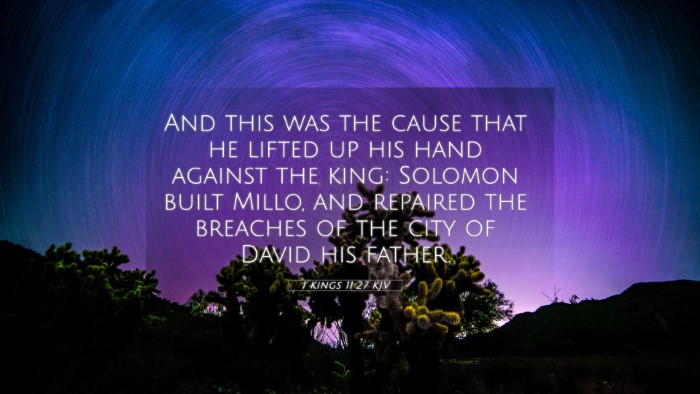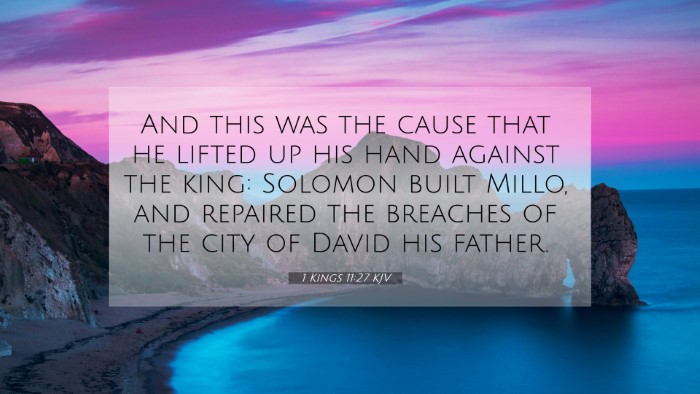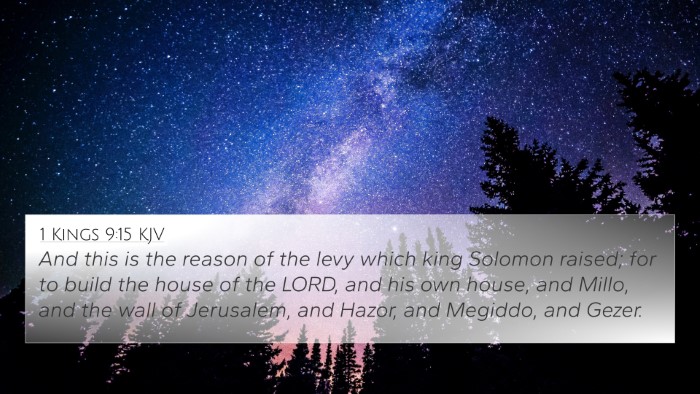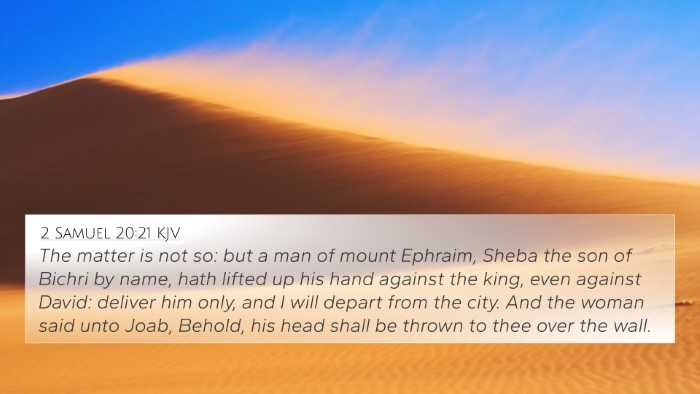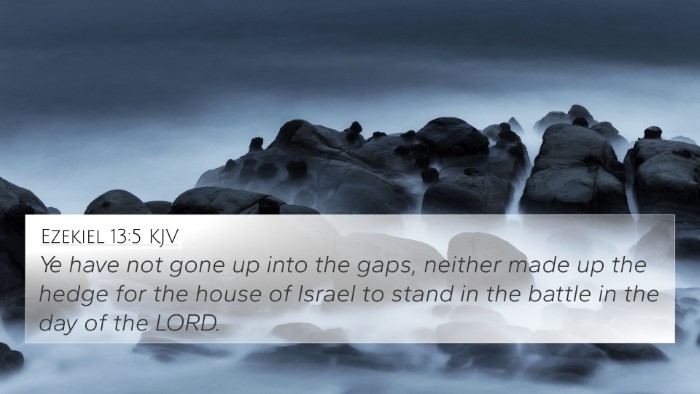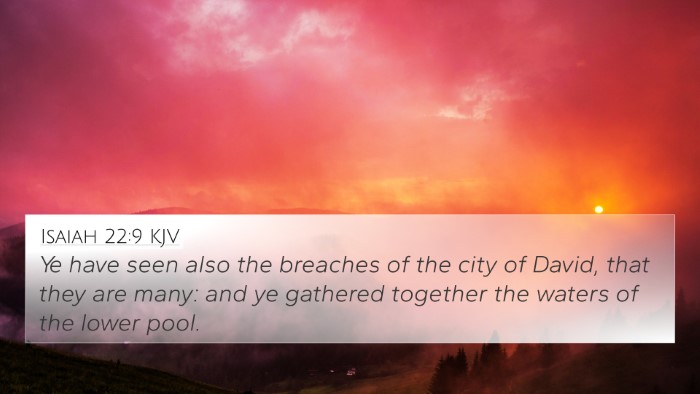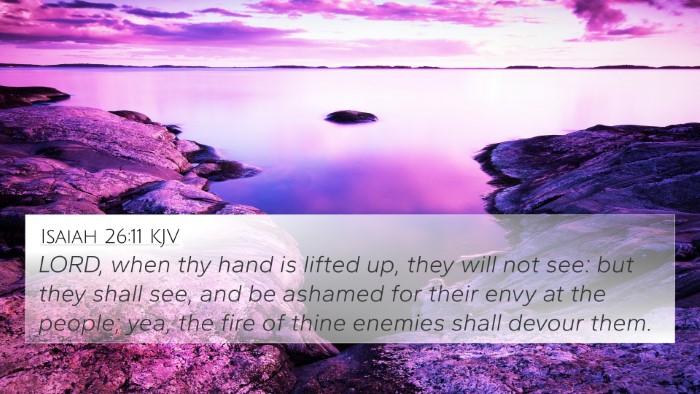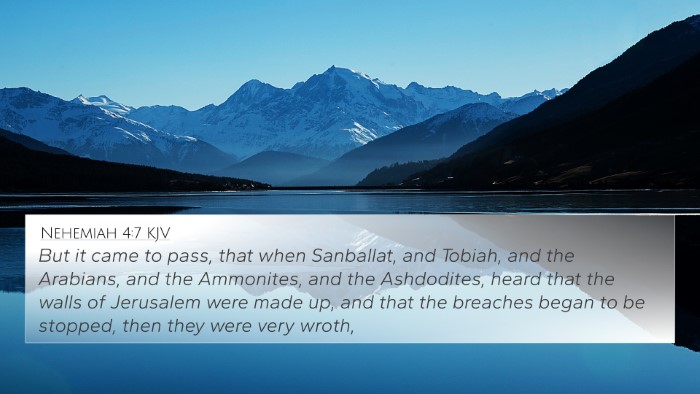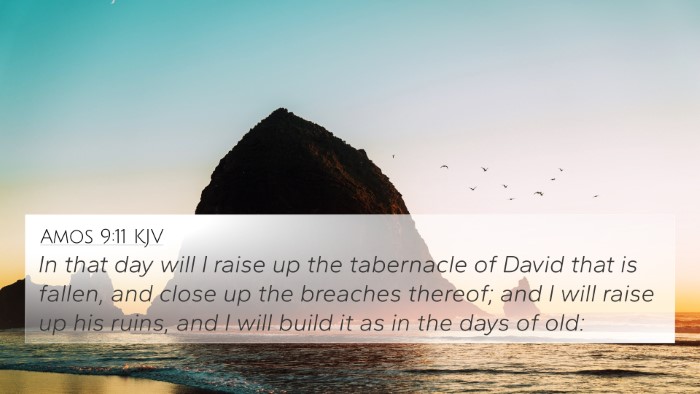Understanding 1 Kings 11:27
Verse: 1 Kings 11:27 - "And this was the cause that he lifted up his hand against the king: Solomon built Millo, and repaired the breaches of the city of David his father."
Overview of the Verse
This verse highlights the actions of Jeroboam, who later becomes a significant figure in Israel's history. His rebellion against King Solomon is set within the context of a political and social landscape marked by division and tension. Solomon's construction efforts at Millo and the strengthening of Jerusalem poignantly contrast with Jeroboam's burgeoning discontent.
Insights from Public Domain Commentaries
Below are insights synthesized from the works of Matthew Henry, Albert Barnes, and Adam Clarke regarding 1 Kings 11:27.
Matthew Henry's Commentary
Matthew Henry points out that Jeroboam's rise to prominence is tied to a larger narrative of God's judgment against Solomon for his idolatry and disobedience. Jeroboam is chosen as an instrument of God to fulfill His promise of dividing the kingdom as punishment for Solomon's actions. Henry emphasizes that the construction of Millo represented Solomon's attempts to fortify his kingdom, yet ironically, it became a backdrop for rebellion.
Albert Barnes' Notes
Albert Barnes elaborates on the significance of the repairs made to the city of David. He indicates that these repairs were not merely physical restorations but symbolic of Solomon's prestige and power. However, he notes that such endeavors fueled resentment and created an opportunity for dissent against the king, as Jeroboam saw himself as someone with divine favor to establish a new rule. Barnes underscores the tragic irony that Solomon's own efforts at fortification led to the very challenge to his authority.
Adam Clarke's Commentary
Adam Clarke provides a historical perspective, explaining that Millo was a fortress built to strengthen Jerusalem. He interprets Jeroboam's act of lifting his hand against Solomon as a definitive move of rebellion sparked by the king's oppressive policies, especially the burdens placed on the people due to these construction projects. Clarke asserts that the burden of taxation and forced labor incited dissatisfaction that would eventually culminate in Jeroboam's leadership of the northern tribes.
Cross-References
1 Kings 11:27 can be seen in relation to several other scriptural passages. Here are some notable cross-references:
- 1 Kings 12:16 - The response of the Israelites to Jeroboam’s leadership.
- 2 Chronicles 10:16 - The people's declaration of independence from Solomon's rule.
- 1 Kings 11:11-13 - God's message to Solomon regarding the division of the kingdom.
- 1 Samuel 15:26 - The theme of divine rejection due to disobedience.
- 2 Samuel 8:14 - David's military successes and their implications for Solomon.
- 1 Kings 11:9-10 - God’s anger towards Solomon for his idolatry and the consequences.
- Jeremiah 23:5-6 - A prophecy about the righteous branch that would come from David.
Thematic Connections
This verse is crucial for understanding the broader themes of rebellion, divine judgement, and political strife in the Biblical narrative. The connections established through cross-referencing enrich our understanding:
- Rebellion Against Authority: Jeroboam’s actions demonstrate a key biblical theme about the rightful and wrongful exercise of power.
- Judgement and Consequence: Solomon’s idolatry led to a fracture in the kingdom, illustrating the principle of divine repercussions for human actions.
- Divine Chosen Leadership: Jeroboam's rise reflects God's sovereignty in the affairs of man, choosing unlikely leaders for fulfilling His purposes.
Connecting Bible Verses
Understanding the connections between 1 Kings 11:27 and other scriptures reveals an intricate tapestry of lessons. Key relationships can be established as follows:
- Linking this verse with 1 Kings 12:20 showcases Jeroboam officially becoming king in the north after Solomon’s death.
- Comparative analysis with 2 Chronicles 12:1 gives insight into Rehoboam’s leadership after Solomon, stressing generational consequences of leadership choices.
- Looking to the Gospels, we can connect themes in Matthew 21:12-13 where Jesus also confronts corruption in leadership, continuing the discourse on authority and righteousness.
Conclusion
1 Kings 11:27 serves as a pivotal verse that marks the beginning of a significant era in Israel's history, filled with themes of estrangement from God, political intrigue, and the change of leadership dynamics. In studying this verse, readers are encouraged to explore the deeper meanings through cross-references, enhancing their understanding of the Bible’s narrative. Tools such as a Bible concordance and a Bible cross-reference guide are invaluable in navigating these intricate connections, allowing for a more enriched Bible study experience.

